|
|
|
Sort Order |
|
|
|
Items / Page
|
|
|
|
|
|
|
| Srl | Item |
| 1 |
ID:
173782


|
|
|
|
|
| Summary/Abstract |
The 2014 Sunflower Movement led to rising political participation among young Taiwanese. Hence, opposition parties and civic groups created programs to support young candidates running in the village chief elections. Compared with the 2010 election, however, fewer young challengers ran in 2014, and they received fewer votes and won fewer seats. Propensity score matching shows that the presence of young candidates on ballots did not increase turnout. However, young candidates affected the election indirectly: young, new candidates attracted more votes from incumbents than from challengers and therefore decreased the incumbent re-election rate.
|
|
|
|
|
|
|
|
|
|
|
|
|
|
|
|
| 2 |
ID:
126629
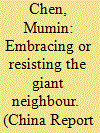

|
|
|
|
|
| Publication |
2013.
|
| Summary/Abstract |
Since 2008, President Ma Ying-jeou and his Kuomintang (KMT) government in Taiwan have adopted the policy of seeking greater economic cooperation with China in exchange of reducing confrontation across the Taiwan Strait. By endorsing the 'One China' principle, the KMT government successfully resumed dialogue with Beijing and signed 18 agreements, ranging from allowing Chinese tourists to visit Taiwan to establishing a closer economic partnership. Yet President Ma's self-claimed achievements in cross-strait peace received severe criticisms from the opposition Democratic Progressive Party (DPP), which accused KMT's pro-China policy as selling out the democratic Taiwan to an authoritarian regime. This article examines the on-going debates between the ruling KMT and opposition DPP about proper strategies towards China, and how such debates make it unlikely for Taiwan to form an effective policy on cross-strait affairs. The differences between KMT and DPP on their respective China policies have led to prolonged distrust between both parties, and between DPP and Beijing. Facing an increasingly powerful China, both parties are short of better ideas to convince voters that their current policy will effectively secure Taiwan's sovereign status or will be beneficial to enhancing Taiwan's interests in the long term.
|
|
|
|
|
|
|
|
|
|
|
|
|
|
|
|
| 3 |
ID:
124897
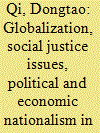

|
|
|
|
|
| Publication |
2013.
|
| Summary/Abstract |
Taking a broader perspective to explore the relations between Taiwan's globalization, social justice issues and the DPP's political and economic nationalism, this study aims to understand the DPP's resurgence in local elections since 2008, and its defeat in the 2012 presidential election. Increasing capital flight from Taiwan to mainland China has contributed to Taiwan's rising unemployment and income inequality. Less privileged Taiwanese, having stronger nationalist sentiments and concerns about the Taiwanese government's open-door China policy, switched their support from the KMT to the DPP during the DPP administration of 2000-2008. Since 2008, the DPP's better balance between its political and economic nationalism has been instrumental in securing popular support, especially at the local level. Nevertheless, in the 2012 presidential election, the DPP failed to convince the majority of Taiwanese voters that its moderate political nationalism could maintain the significantly improved cross-Strait relations vital for Taiwan's economic revival under the current bleak world economic conditions.
|
|
|
|
|
|
|
|
|
|
|
|
|
|
|
|
| 4 |
ID:
100655
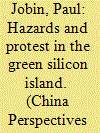

|
|
|
| 5 |
ID:
170371
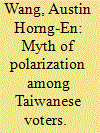

|
|
|
|
|
| Summary/Abstract |
Are Taiwanese voters polarized? By presenting four novel visualizations based on a factor analysis of Taiwan National Security Surveys from 2002 to 2017, this article describes the contours of structural change in Taiwan politics. Overall, the cross-strait position among Taiwanese voters can be described by a stable inverted U shape over time. This arises from the fact that most nonpartisans—typically neglected in the literature on polarization—are moderate. Before 2008, increasing polarization among partisans can be attributed to pan-green voters moving toward independence. Between 2008 and 2014, decreasing polarization stems from moderates self-identifying as pan-blue supporters. Since 2014, a record-breaking number of nonpartisans have left the pan-blue camp, and more extreme pan-blue voters have contributed to a return of polarization among partisans. The results yield important implications for the study of polarization and populism, as well as for the future of Taiwanese politics.
|
|
|
|
|
|
|
|
|
|
|
|
|
|
|
|
| 6 |
ID:
156605
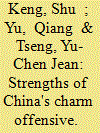

|
|
|
|
|
| Summary/Abstract |
China's trade with Taiwan has a political motive: winning the hearts and minds of the Taiwanese people. The effectiveness of China's economic statecraft can be examined in the Syuejia (Xuejia) case, where Taiwan put up strong resistance to the generous benefits offered by China. This article investigates the political implications of the Chinese-designed contract farming programme in Syuejia and argues that if economic favours are delivered, and positive impressions also created, political attitudes can be revised. Without these two prerequisites, however, replicating the Syuejia results elsewhere and thus disturbing the cross-Strait status quo will be difficult. When put in a theoretical context, the changes in the political landscape of Syuejia illustrate the interplay of economic interests and political identity.
|
|
|
|
|
|
|
|
|
|
|
|
|
|
|
|
|
|
|
|
|